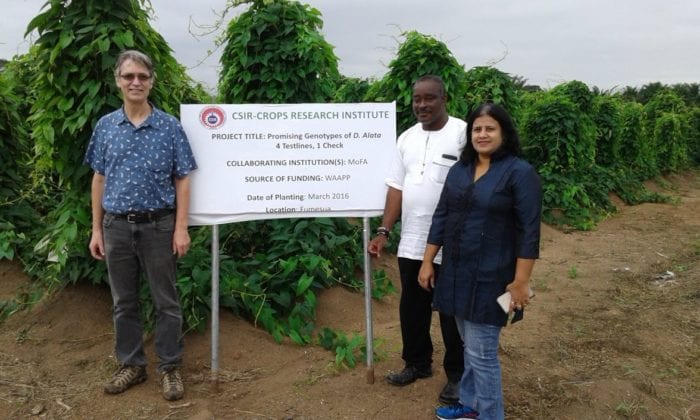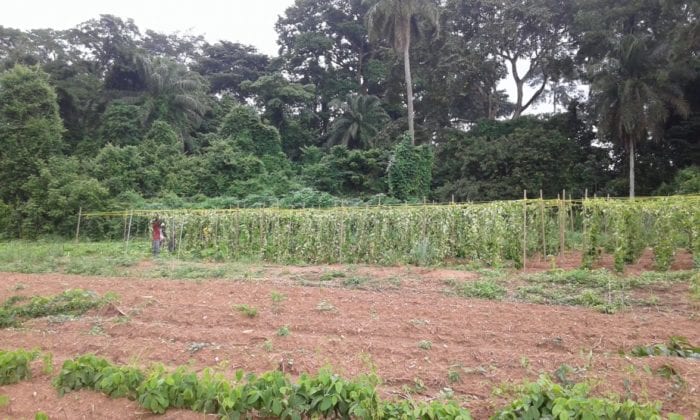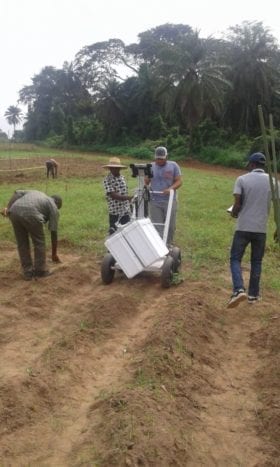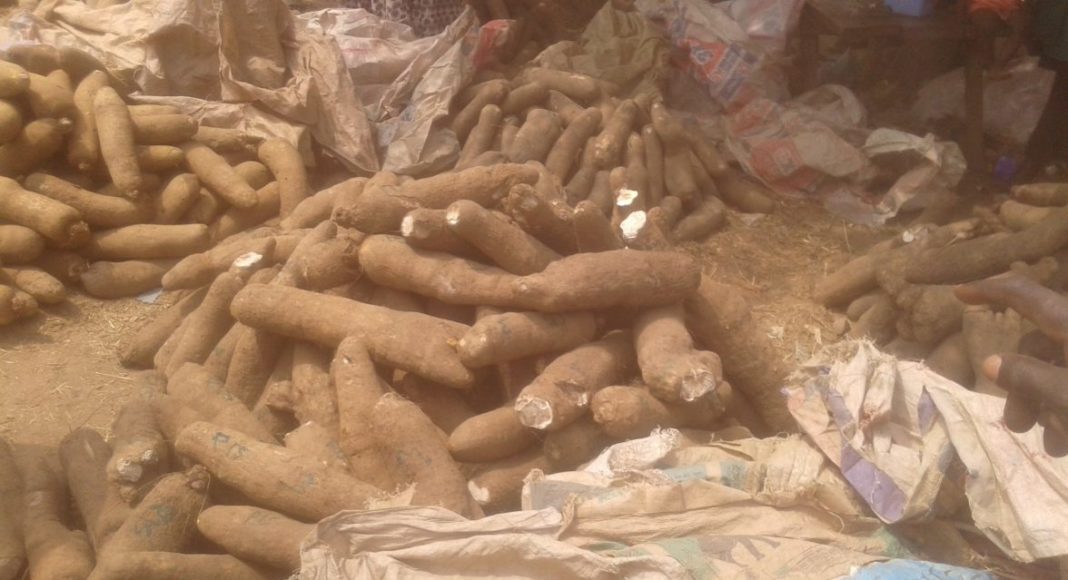David De Koeyer spent three years doing research work in Africa which gave him a fresh perspective on plant breeding and is helping him with his current work as Agriculture and Agri-Food Canada’s potato breeder.
Two years ago, David De Koeyer was named the lead potato breeder for Agriculture and Agri-Food Canada (AAFC). Under his direction, the national potato breeding program has shifted slightly to become more responsive to the needs and wants of potato growers and consumers — this was partly shaped by the three years he spent in Africa helping to breed better yams for West African farmers.
In May 2015, just after turning 50, De Koeyer left the AAFC Fredericton Research and Development Centre on extended leave for a term position at the International Institute of Tropical Agriculture (IITA) in Ibadan, Nigeria — 8,000 kilometres away in a whole different world.
“I knew that Africa is a continent where agriculture is very important, but there are major challenges in feeding the populations and applying technology advances to help the agricultural system there,” he says.
“I’ve always been interested in development work, and I hoped that this opportunity would have an impact on alleviating poverty in West Africa,” De Koeyer adds. “I thought it was a good match.”
As De Koeyer tells it, the “good match” turned out to be transformative for the long-time potato breeder, who has worked as a geneticist combining plant biotechnology and potato breeding for nearly 20 years.

“My experience in Africa was life-changing,” he says, noting his time spent there has been instrumental in shaping some of his decisions as AAFC’s potato breeder as it was a “great learning experience.” He has been trying to transfer some of his knowledge learned there to his current position.
“Something I learned in Africa was that to develop new varieties, you need to be very focused and clearly define what your priorities are,” he adds. “That’s an idea we’re trying to implement into our potato breeding program here, to really make it as efficient as possible given the limited resources that we have. We can’t do everything.”
De Koeyer says he found it useful to view AAFC’s potato breeding efforts from the perspective of a private breeding company as he realized the same efficiencies and focus need to be considered in order to have the new varieties farmers want.
Passion for Plant Breeding
For De Koeyer, there’s another, more personal reason why he’s grateful for his time in Africa, as it allowed him to reconnect with his passion for plant breeding.
“Keeping that connection to the applied work is something that’s very important to me,” De Koeyer says. “I think over time my work had become a bit more disconnected from applied plant breeding than I would have liked it to be.”
“I saw this opportunity in Africa as something that would allow me to combine my interests in plant breeding with my expertise in bioinformatics and genomics and different aspects of technology.”
While in Africa, De Koeyer served as project leader for AfricaYam, an international development program funded by the Bill & Melinda Gates Foundation, aimed at boosting yam productivity and providing West African farmers with improved yam varieties. He helped establish successful yam breeding programs not just in Nigeria but also in Ghana, Côte D’Ivoire and Benin.
“We improved procedures, provided training to scientists, and released five new varieties,” says De Koeyer. “We saw increased pollination success, better seedling establishment, and created a stable breeding pipeline generating new yam variety candidates.”

During his stint with IITA, De Koeyer was able to meet and work with many different people from around the world — something which he really enjoyed.
“What I actually liked the most was the interactions with the Nigerians who were part of my team and those who were actually doing the work that was needed to support the project,” he says.
Yam Production Challenges
Yams have long been a staple for many West Africans, but as De Koeyer points out, yam producers there face some unique challenges.
Like potato, yam is a crop which uses tubers as seed for the following year, which requires the tubers to be stored between planting seasons. According to De Koeyer, storage issues such as disease are exasperated in West Africa due to a lack of controlled storage conditions, and there are few formal seed systems in place for planting clean material.
De Koeyer says in many areas, farmers also have to contend with poor soil and the challenge posed by a climate with distinct wet and dry seasons. In addition, he adds, yam production is primarily done by manual labour, and crop inputs simply aren’t accessible for most farmers.

De Koeyer also sees these challenges as opportunities, and believes measures such as increasing mechanization, developing better seed production and distribution systems, and providing producers with better varieties, are just some of the ways growing yams can be made more productive and profitable for West African farmers.
Given the high population growth rates in West Africa, De Koeyer notes food production is becoming even more important. A major problem, though, is many young people there are turning away from farming, which is one of the reasons there is widespread underemployment among youth.
“They see their parents having to work very hard and earn very little as farmers,” he says. “They don’t consider agriculture as a business to get into or have their education go in that direction.”
De Koeyer says this is changing, thanks to improvements in agriculture and programs such as one offered by IITA that’s aimed at developing ‘youth agripreneurs’.
“They take university graduates and then train them for a year or two, and their goal is to set up new businesses that are centered around agriculture,” he says.
De Koeyer sees plant breeding as another area with great potential for youth employment.
“I had a lot of very good experiences working with students,” he says. “They really want to learn the new science and learn how to do the best research and develop the best varieties they can.”
De Koeyer is still in contact with the friends and colleagues he met in Africa. “I hope to at some point, maybe after I retire, to spend some more time in Africa.”
But overall, he believes many scientists could similarly benefit from international development work like the kind he experienced in Africa and would recommend it. De Koeyer adds his time spent in Africa gave him a new perspective on the importance of the research being done at AAFC.
“We have a world-class institution here (at AAFC), and the impact often can go beyond our national borders,” he says. “It’s all about making connections to collaborators in similar fields. It is very valuable.”











